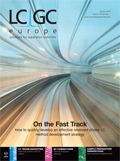New Horizons in Atlanta for Pittcon 2016
A glimpse of what’s on offer for chromatographers at Pittcon 2016, which will be held from 6–10 March 2016 at the Georgia World Congress Center in Atlanta, Georgia, USA.
A glimpse of what’s on offer for chromatographers at Pittcon 2016, which will be held from 6–10 March 2016 at the Georgia World Congress Center in Atlanta, Georgia, USA.
Photo Credit: Jeremy Woodhouse/Getty Images

Pittcon 2016 will be held at the Georgia World Congress Center located near Atlanta City’s vibrant downtown. America’s most accessible city has something to offer for everyone with attractions, restaurants, and culture around every corner. And for five days in March, Atlanta will be home to this leading annual conference and exposition for laboratory science. Host to more than 300 restaurants in its downtown area alone, Atlanta has a diverse range of restaurants within walking distance of the Pittcon conference floor - and if you feel like taking a spin, visit The Sun Dial Restaurant, Bar & View for a 360° rotating view of Atlanta from 73 storeys high. Visit America’s only giant panda twins, Mei Lun and Mei Huan, or swim with the whale sharks at America’s largest aquarium. If all that seems a bit too exciting, you could of course just sit back and watch the big city life fly by. For chromatographers though, it is Pittcon 2016 that will be the main attraction in Atlanta, and there is no better time than now to attend this global event that combines the latest chromatographic and ancillary equipment from leading companies across 30 countries with a diverse mix of technical programmes and short courses. Learn about new techniques, the latest research, and prominent scientific findings. Technical experts will be on hand to answer questions, troubleshoot issues, and provide useful tips for a more effective and efficient laboratory. An exciting new feature at this year’s Pittcon is the addition of two live demo areas where attendees can participate in interactive product demonstrations. The dedicated areas will cover topics such as air monitoring, new techniques in water testing, innovative products to increase lab efficiency, and recent developments in spectroscopy, spectral databases, and techniques for using hazardous materials. The expo begins the morning of 6 March 2016, after a brief opening ceremony that will feature remarks from the Pittcon 2016 president.
Technical Programme
The technical programme is a key feature of Pittcon, offering attendees the opportunity to hear about the latest research and findings from prominent scientists as well as the chance to network and forge new relationships. The programme features symposia, contributed and oral sessions, workshops, awards, and posters covering a variety of topics related to liquid (LC) and gas chromatography (GC) in a wide range of applications such as environmental, genomics, proteomics, energy, materials science, food science, pharmaceuticals, polymers and plastics, QA/QC, water analysis, and more. This year’s conference highlight is a lecture presented by the 2014 Nobel Laureate W.E. Moerner, of Stanford University, who will deliver the Wallace H. Coulter Lecture, “
How Optical Single-Molecule Detection in Solids Led to Super-Resolution Nanoscopy in Cells and Beyond
”. Dr. Moerner’s talk will focus on his research in physical chemistry and chemical physics of single molecules, single-molecule biophysics, super-resolution imaging and tracking in cells, and the trapping of single molecules in solution. The following is a sample of other programme highlights: •
Two-Dimensional Liquid Chromatography for Rapid Parallel Separation of Biopharmaceuticals
: Yan He of Pfizer will present findings on the evaluation of two-dimensional liquid chromatography (2D LC) for parallel separation of biopharmaceuticalsâ¨. •
Antibody-Drug-Conjugates (ADCs) Drug Product Profiling by Multi-Dimensional HPLC
: Kelly Zhang of Genentech will discuss antibody-drug-conjugates (ADCs), the new horizon of biopharmaceuticals, and how 2D LC is a powerful tool that offers the selectivity and peak capacity to enable the complete profiling of ADC drug products. •
Column Technology for the Chromatographic Characterization of Biopharmaceuticals
: Davy Guillarme of the University of Geneva (Switzerland) will review trends in current state-of-the-art LC column technology and the potential applications of different modes of chromatography for the characterization of therapeutic proteins. •
Chemometrics: A New Dimension in Chromatography
. This session, organized by Amber M. Hupp of the College of the Holy Cross (Massachusetts, USA), will focus on advances and applications of the use of chemometric methods in both gas and liquid chromatography. •
Advances in Instrumentation for Ion Mobility Mass Spectrometry
, organized by Matthew F. Bush, of the University of Washington (USA). This session will feature recent advances in instrumentation for ion mobility mass spectrometry. Speakers will showcase the use of these new instruments to enable high-performance analyses of the structures and identities of small molecules, peptides, proteins, and protein complexes. •
New Bioanalytical Separations for Molecular Mechanisms of Disease
, organized by B. Jill Venton, of the University of Virginia (USA) and Lisa A. Holland of West Virginia University (USA). This session will highlight a variety of separation techniques, including capillary and microfluidic electrophoresis, immunoassays, and liquid chromatography–mass spectrometry (LC–MS). The talks will show how new separation-based techniques are advancing the understanding of molecular mechanisms of disease, leading to better detection and treatment. •
Ultrahigh-Resolution Mass Spectrometry: A New Frontier
, organized by Alan G. Marshall of Florida State University, will address how ultrahigh-resolution mass spectrometry, with a resolving power > 100,000, is revolutionizing mass analysis. •
Miniature Mass Spectrometers
, organized by R. Graham Cooks and Zheng Ouyang of Purdue University (USA), will include a live demonstration, allowing audience members to see some of the current state-of-the-art instrumentation and its applications in operation. The focus is on battery-powered autonomous systems weighing less than 50 lb.
Pittcon 2016 Award Symposia
An important feature of Pittcon is to recognize and honour those who have made outstanding contributions to analytical chemistry and applied spectroscopy. A number of oral symposia will honour chromatographers at the 2016 conference. For the second year, the
LCGC
awards will be presented at Pittcon. The 2016
LCGC
Lifetime Achievement in Chromatography Award will be given to Milton L. Lee of Brigham Young University (USA), and the 2016
LCGC
Emerging Leader in Chromatography Award will be presented to Debby Mangelings, Vrije Universiteit Brussel (Belgium). Talks in that session will include: •
Columns in Small-Scale Chromatography
, Milton L. Lee of Brigham Young University •
Recent Chromatographic and Mass Spectrometric Developments Applied to the Characterization of Recombinant Proteins, Monoclonal Antibodies, and Antibody-Drug Conjugates
, Pat Sandra of RIC (Belgium) •
Analytical Glycoscience: Quo Vadis?
Milos V. Novotny of Indiana University (USA) •
Generic Chiral Separation Strategies for Pharmaceutical Compounds Using Chromatographic and Electrophoretic Techniques
, Debby Mangelings of the Vrije Universiteit Brussel •
Recent Trends in High-Performance Liquid Chromatographic Separation of Enantiomers
, Bezhan Chankvetadze of Tbilisi State University (Georgia) This year the Chromatography Forum of the Delaware Valley will present Stephen Weber of the University of Pittsburgh (USA) with the 2016 Dal Nogare Award for his work in capillary liquid chromatography. This symposium will include the following presentations: •
How Much Performance is Lost in LC by Optimizing Only Velocity and Column Length Using Limited Number of Particle Size?
Peter W. Carr, University of Minnesota (USA) •
UHPLC–MS for Multiplexed Neurochemical Analysis
, Robert T. Kennedy, University of Michigan (USA) •
Integrated Microfluidic Separations Devices Interfaced to Mass Spectrometry
, J. Michael Ramsey, University of North Carolina at Chapel Hill (USA) •
The Second Dimension is a Strange Place - Fundamental Aspects of the Optimization of the Second Dimension in Two-Dimensional Liquid Chromatography
, Dwight R. Stoll, Gustavus Adolphus College (USA) •
Opportunities and Challenges with Capillary Liquid Chromatography
, Stephen Weber of the University of Pittsburgh (USA) Other award symposia that chromatographers don’t want to miss include those for the Pittsburgh Conference Achievement Award, presented this year to Jared L. Anderson of Iowa State University, and the Satinder Ahuja Award for Young Investigators in Separation Sciences, awarded to Matthew D. Miller of Dow Chemical.
Professional Development
Pittcon offers a wide range of educational components including more than 50 short courses across relevant topics in GC and LC. Taught by leading experts in their field, the classes range from beginner to intermediate levels in half-day up to two-day sessions. Short courses are extremely affordable and are suitable for the seasoned professional, the recent graduate, or the researcher interested in learning a new skill set. The following is a sample of short course titles: •
Essentials of Modern HPLC/UHPLC 2: Operation, Troubleshooting, and Method Development
, a one-day intermediate course taught by Michael Dong of MWD Consulting. •
LC–MS Strategies for the Identification of Impurities, Degradants, and Metabolites
, a beginner one-day class taught by Mike Lee of Milestone Development Services. •
Solventless Sample Preparation Prior to Mass Spectrometric Analysis
, a one-day course taught by Gyorgy Vas of Intertek/VasAnalytical. •
Instrumentation and Methods of Petroleum and Gas Analysis by Gas Chromatography
, a one-day beginner course taught by Matthew Klee of Dani Instruments, Inc.
Networking Sessions
Networking has major benefits and with thousands of members of the scientific community attending Pittcon, it is the perfect place to forge new relationships and expand one’s professional circle. Pittcon strives to make networking a pleasure and not a chore with conferee networking sessions that bring together those with similar interests to discuss new techniques, resolve problems, and brainstorm new ideas. These 90-minute sessions, which are included in the cost of registration, cover applications such as nanotechnology, environmental, food science, biomedical, fuels, separation sciences, and more. There are more than 20 sessions from the Sunday to the Wednesday of the conference. A few sessions of particular interest to chromatographers include: • Cannabis Analytical Testing Forum • Mobile Phase Selection for LC–MS Analysis Detection Techniques for Pesticides and Contaminants in Food and Pharmaceutical Raw Materials at Ultralow Detection Levels • Quality by Design for Development of Analytical Methods.
Stay Connected with the Mobile App
To help organize all there is to see and do during conference week, the Pittcon mobile application is available for download for free on iOS and Android devices. The App provides complete details about exhibitors, technical sessions, short courses, conferee networking, and Atlanta nightlife and dining options. This year’s conference and exposition will have something for everyone in one place for one exciting, productive week.
Contact:
Marian Nardozzi
E-mail:
publicity@pittcon.org
Location:
Georgia World Congress Center, Atlanta, Georgia, USA
Tel:
+1 412 825 3220 x 203
Fax:
+1 412 825 3224
Registration:
www.pittcon.org/register
Stay Connected with LCGC
The
LCGC
team will be at Pittcon 2016 (Booth 3519), bringing you the latest news and updates from around the event. Tweet us via @LC_GC or follow us on Facebook
LCGC
Magazine to keep up-to-date or to send us your personal conference highlights.

New TRC Facility Accelerates Innovation and Delivery
April 25th 2025We’ve expanded our capabilities with a state-of-the-art, 200,000 sq ft TRC facility in Toronto, completed in 2024 and staffed by over 100 PhD- and MSc-level scientists. This investment enables the development of more innovative compounds, a broader catalogue and custom offering, and streamlined operations for faster delivery. • Our extensive range of over 100,000 high-quality research chemicals—including APIs, metabolites, and impurities in both native and stable isotope-labelled forms—provides essential tools for uncovering molecular disease mechanisms and exploring new opportunities for therapeutic intervention.
New Guide: Characterising Impurity Standards – What Defines “Good Enough?”
April 25th 2025Impurity reference standards (IRSs) are essential for accurately identifying and quantifying impurities in pharmaceutical development and manufacturing. Yet, with limited regulatory guidance on how much characterisation is truly required for different applications, selecting the right standard can be challenging. To help, LGC has developed a new interactive multimedia guide, packed with expert insights to support your decision-making and give you greater confidence when choosing the right IRS for your specific needs.

.png&w=3840&q=75)

.png&w=3840&q=75)



.png&w=3840&q=75)



.png&w=3840&q=75)











